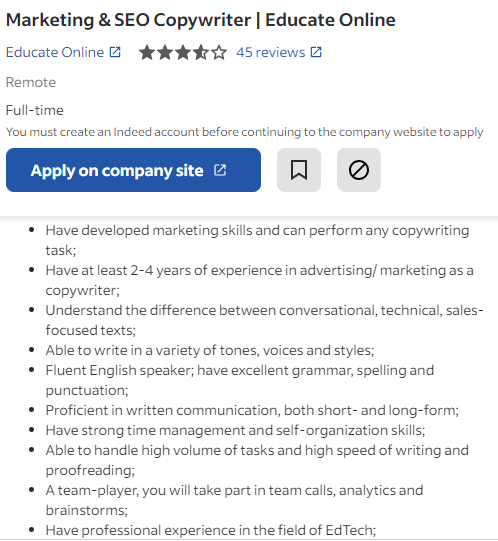Getting organic traffic is an important part of any Digital Marketing strategy. And the best way to increase your traffic is by getting better rankings on Google.
A solid SEO strategy will help you with that, but there’s more than applying on-page and off-page SEO rules to your blog.
SEO writing is a must, and it will guarantee that you’re not neglecting the user experience on your pages. After all, the page experience is one of the most important ranking factors.
If you want to better understand SEO writing, keep reading!
- What Is SEO Writing?
- Why Is Writing for SEO Important?
- What Are The Basics of SEO Writing?
- What Is An SEO Copywriter?
- SEO Copywriter Job Description
- SEO Copywriting Services
- Freelance SEO Copywriters
- SEO Content Writing Examples
- 10 Must-Follow SEO Writing Rules
- 4 Tips to Learn SEO Writing
- 6 SEO Writing Best Practices
- 4 Best Tips to Be a Successful SEO Copywriter
- Leverage WriterAccess for Exceptional SEO Writing
- SEO Writing FAQ (Frequently Asked Questions)
Download this post by entering your email below
What Is SEO Writing?
SEO writing is the process of writing content with the goal of ranking on the first page of search engines like Google. This is achieved by researching relevant keywords and creating optimized content that answers the user’s intent.
Google, for example, uses “spiders” that crawl content to see what it’s about. During this crawl, they learn a lot about the web page through the language used on it.
SEO writing optimizes the content on the page so that search engines will more easily crawl its content and judge it favorably. When it is judged more favorably, it is given a better placement in the SERP.
If the content is created without SEO in mind, it may not appear to be search engine friendly, and the crawlers may not even figure out what the page is about.
Why Is Writing for SEO Important?
SEO writing is done to help content rank better on Google. If the content is not optimized, it will come up several pages back in a search.
And why is it so important to get on that first page?
A study found that the number of clicks that pages get depends not only on getting onto that first page of search results, it also depends greatly on getting as high up on that page as possible.
The first result on the first page gets clicked on by more than 28% of people doing the search. After that first result, the percentages go down with each spot on the page. So you need your site to be one of the first results that people see.
Writing for SEO is also important because it is a marketing technique that keeps going for the life of your website.
Many people do well with PPC advertising, but if they stop paying for that advertising, it will no longer bring traffic.
Good SEO content keeps working for your website no matter what else you do to market your site.

What Are The Basics of SEO Writing?
There is no magic formula for ranking the best in search engine results, but there are several parts of the Google algorithm that we do know about. Content should be written with those aspects in mind to rank better.
One of the most important aspects of SEO writing is using the proper keywords. This means knowing what people are searching for when they are looking for sites like yours.
This requires the SEO copywriter to do some keyword research and create a list of words and phrases that need to be included.
Google looks at whether there are words related to the main keywords to be sure of what the content is about.
Using these related words is called latent semantic indexing, and it helps tremendously with SEO.
The crawlers also assess whether the content is written for an audience or purely for SEO. This is why SEO copywriters have to avoid keyword stuffing.
The balance that must be struck is for the content to appeal to human readers as well as search engine spiders.
The use of complex language is another factor in search engine crawls. If the language is too simple and uses too few unique words, it is not assessed as being of high value.
SEO writing has to flow well and be complex enough to impart a lot of information on its topic while using language naturally.
“Today, SEO writing is more than just focusing on keywords”, says Anastasia Kotsiubynska, SEO Team Lead at SE Ranking. “It’s about understanding the user’s intent and all potential questions your visitors have in mind.”
While using keywords is still important, you need to also think in terms of entities–what concepts and points your content should cover to help a user get the information they need as well as be able to rank in your SERPs.
Also, today, it’s important to offer your unique point, perspective, and expertise; it’s something you can’t get if you use ChatGPT for your content creation and don’t add a human touch.
What Is An SEO Copywriter?
An SEO copywriter is a person who is an expert in SEO copywriting. They know how to implement the best practices and standards of SEO in writing and help drive traffic to websites.
They specialize in different types of copy as well, like product pages, emails, and other types of marketing and sales materials.
An SEO copywriter isn’t the same as a traditional content writer. Rather than focusing on educational or informative articles, the SEO copywriter is dedicated to converting leads.
However, a content team might work together to accomplish the same goals as a traditional content writer and an SEO copywriter.
You can find talented SEO Copywriters with WriterAccess! Get 14-day trial and access over 15K expert freelancers.
What Skills Should an SEO Copywriter Have?
An SEO copywriter should understand how to write content with a unique voice and a writing style that flows well.
They should know exactly who the target audience will be so that they can factor that into the way the copy is written.
The copywriter needs to know what the competition is doing with its copy, and should be able to do a quick research and see what it will take to rank well for a page of content.
They need to be able to write in a persuasive tone so that the copy will convert and also need to have enough creativity to come up with new content topic ideas, especially for blogs.
A good SEO copywriter will also understand the basics of latent semantic indexing to further boost the position of the content. They have to be able to pack text with as much information as possible to provide a good experience for both readers and search engine crawlers.
An SEO copywriter also has to stay up on all the new changes to search engine algorithms.
Periodically, there will be changes in the algorithm to make one aspect of content more important than before. An SEO copywriter has to stay on top of these changes so that they can be integrated into his work.
SEO Copywriter Job Description
An SEO copywriter job position will list the skills and experience needed to qualify for a specific role in a company.
Sometimes the job description will be for a digital writer, SEO content writer, web content writer, or SEO specialist, rather than an SEO copywriter.
The job description will likely ask for someone who understands how to use and adapt to digital tools to learn new search trends, keywords, and tactics. It might also require that you know how to write content that is optimized for search results.
Other common line items in the job description will include the ability to understand and study data, improve a digital presence, measure the effectiveness of SEO campaigns and initiatives, and optimize existing content.

SEO Copywriting Services
Here are a few of the common types of services and copy that an SEO copywriter might be responsible for:
- Emails
- Checkout screens
- Product pages
- Website copy
- CTA buttons
- Landing pages
- Brand messaging
- Ad content
- Navigation instructions
- Product descriptions
- Print copy
Freelance SEO Copywriters
While many companies might be looking to hire a full-time, in-house SEO copywriter, there are also opportunities for freelance SEO copywriters. As a freelance SEO copywriter, you would have a multitude of clients rather than be an employee of a single company.
There are many benefits to becoming a freelance SEO copywriter rather than a traditional SEO copywriter.
You will have complete control over your client list and what types of assignments you take on. In addition, you would be able to take on as many clients as you want, and potentially have an unlimited amount of income.
However, there are considerations to keep in mind.
As a freelancer, you have no guarantee of income, which might mean that you struggle to find work and don’t have a reliable paycheck. You also have to be able to manage client-facing tasks and have the ability to sell yourself and your services. This can make freelancing difficult for some people who are unfamiliar with these types of soft skills.
If you are interested in becoming a freelance SEO copywriter, then check out the WriterAccess and see what we can offer.
SEO Copywriter Salary
The average salary of an SEO copywriter is around $49,000 a year. Keep in mind, however, that this is for salaried positions, not just freelancers.
Depending on where you live, what types of services you provide, and whether you freelance or simply work for a single company, your average salary might be different.
SEO Content Writing Examples
You can learn a lot about what works and what doesn’t with SEO writing by looking at how other brands and websites are meeting their goals. That said, here are a few examples of especially excellent SEO content writing to inspire you and your content production team.
Terrific Readability
Everyone knows what it’s like to visit a particular webpage searching for information, only to be immediately overwhelmed by the sheer amount presented.
That’s often all it takes to inspire a visitor to go elsewhere for what they need, even if the first site was capable of answering their questions.
This SEO writing example from Clarity Council demonstrates what a powerful difference writing for readability can really make.
Not only is the content itself clear and concise, but it’s formatted in a way that’s easy to skim, read, and digest.
Appropriate Tone
Tone always matters when you’re producing SEO writing to connect with a particular audience and show why your product is the solution they need. But this is especially important when framing very personal products as the answer to a consumer’s prayers.
This content example from Chiavaye helps establish brand trust when it comes to treating symptoms of sensitive health issues like IBS, endometriosis, and more.
The voice behind the writing assures the reader that not only are they not alone, but they’ve come to the right place for understanding and real solutions they can trust with their health.
Eye-Catching Titles
Each piece of SEO writing you produce for your site needs to be able to stand out in a veritable sea of other options. That said, your title is the first taste a potential reader has regarding an individual piece of content. It’s crucial that you make yours count in all the right ways.
Clickable titles are concise while remaining informative. They’re also intriguing enough to entice the reader to see what else that piece might have to say.
One example of an effective headline technique is to use specific numbers in your title. Numbers prime a reader as far as what to expect, assuring them that they’ll be getting organized information that contains a particular number of solutions.

10 Must-Follow SEO Writing Rules
1. Write for Humans
Know your audience and write for them.
SEO copywriting is only one part of SEO. Another important part is backlinking. The content you write must attract backlinks from other sites in order to improve its SEO.
Therefore, the copy that you write has to be written for a human audience first. If it sounds too robotic or is keyword-stuffed, a few sites will want to link to it later.
2. Understand Google’s Algorithm
Understand the latest algorithms of Google. As the largest search engine, it is important to know how to drive more traffic to your blog. Check our article about Google’s March 2024 core update and stay in the loop.
They tweak their search algorithm regularly so that the best-quality pages get ranked more highly. Google is concerned about wanting the search engine to be as effective as possible.
When you understand all that the search engines are looking for, you can better deliver it.
3. Know How to Find Keywords
You have to know how to perform keyword research and how to pick the best keywords for the content you’re writing.
This includes being able to assess how popular the main keyword is and how to choose long-tail keywords.
Often, the main keywords for a topic have far too much competition for the first few places in search engine results.
This makes it necessary to go for keywords that have a lower search volume. An SEO copywriter has to be able to assess the amount of competition for each word or phrase and choose the best ones to use.
4. Write Long Content
The Google Panda 4.1 algorithm update was put in place to reward longer, more informative content and to penalize thin content.
A good rule of thumb is to have each page contain at least 1,000 words of high-quality content. Shorter pages may simply not have enough complexity for the current algorithms.
Writing longer content also gives you the freedom to serve up information in a number of ways such as lists and tables.
You need to pack a lot of information into each page, and having some varied methods of presenting information can be helpful to both people and search engines.
5. Make Every Sentence Unique
Search engine algorithms all reward unique content. If parts of a page are copied from another web page, it may get marked as spam and give a poor ranking.
Using sites like Copyscape can help you to make sure that every part of your SEO copy is unique.
If you find any duplicates, reword those parts while keeping the copy sounding natural.

6. Use Related Words
The latest algorithms look for common words that accompany the keywords that you use.
That lets the search engine know that the content is really about that topic. It usually isn’t necessary to research which accompanying words to use, as they are generally the basic words that something about that topic would use.
If you aren’t sure how to use these companion words, study latent semantic indexing and put that knowledge to use.
7. Link to High-Quality Sites
Using links as information citations is a common way to show where the information came from.
However, your site should not be using information from low-quality sites. If you have links to spammy sites, the information on your page will be assumed to be spammy as well.
Always link to high-level websites that are popular in their own right.
The overall goal of search engines is to make good information universally available. When you link to good sites, you show search engines that you get your information from useful sites.
8. Use Varied Content Types
A great web page may include several ways to impart information. These often include other types of media to back up and expand on the information in the text.
The use of videos on the page is excellent for this purpose. Using helpful pictures is also useful to readers.
Too much gray text can be hard for people to read. Breaking it up makes it flow better and allows for easier reading.
9. Write Meta Information
Every piece of content needs meta tags and a meta description. This allows search engines to display a short description of the content you created.
You also need a title tag. This should be no longer than about 70 characters. This is the maximum allowed for titles by Google.
The meta description should be no longer than 160 characters. If you aren’t up on basic HTML, learn some of the basics so that you can create these valuable pieces for your content.
10. Use Plenty of Subheadings
No matter how narrow your topic is, it can be broken up with subheadings. This also allows you to have your keywords where they are prominent.
Subheadings help to break up the text, and they make it easier for readers to find exact the information they are looking for.
In SEO writing, you need to consider the goals set for your strategy and the ranking factors of search engines.
However, writing content is much more of a process to meet user demand than SEO requirements.
When you provide a qualified and unique experience of reading and visiting the page, with high-quality content, it automatically favors the position of your page in the SERPs.
An SEO strategy needs to be mature to work well. Take our SEO Maturity Assessment and identify where to focus efforts to evolve to the next stage on the maturity curve!
4 Tips to Learn SEO Writing
Even if you have an in-house staff or a team of talented freelancers to help you with the daunting task of filling your website with amazing SEO writing, it’s still important to understand the basics yourself. Thankfully, learning the ropes isn’t as complicated as it might seem to many beginners. Here are some tips to get you started.
1. Understand the goals of SEO writing
No two businesses are going to be exactly alike when it comes to the desired outcome of their SEO strategies. But some goals are universal, so every effort to learn SEO writing should start with a complete understanding of what they are.
One of the most critical is to help search engine crawl bots find and properly index your site so it can rank better for relevant search terms, so start there.
Understand which key phrases you should target and use them in critical areas of your content to improve optimization. Examples include your URL, SEO title, and headings (where appropriate). Be sure to sprinkle them naturally throughout the body of your content, as well.
2. Make your content engaging
One common mistake many new to SEO writing make is over-focusing on what they think the search engines want to see. What you should be doing is writing with the needs of your human readers in mind.
Google’s job is to deliver search results to information seekers that will actually answer their questions and address their needs.
Key elements search engines consider when assessing a webpage include readability and formatting. In other words, writing for human beings is writing for search engines.
3. Stay on top of SEO trends
Writing great content that helps you make progress toward your SEO goals isn’t the type of thing you learn to do just once. Search engines, social trends, and SEO techniques are constantly changing and evolving, so good SEO writing does the same.
Always be aware of the most recent changes to Google’s algorithm and current web user tastes when it comes to their content. Update your go-to approach to SEO writing accordingly.
4. Track and measure results
If you don’t keep track of your results when it comes to your SEO writing efforts, you’ll have no accurate way to tell whether you’re making progress toward your long-term goals. So keep careful track of how each of your pieces performs.
Test new techniques by tracking the results you get with those, as well. You want to ensure that anything new you try is actually more effective than what was working for you before, if not more so.
6 SEO Writing Best Practices
Originality is key when it comes to creating SEO writing that really pops and keeps your readers engaged, but so is a proper understanding of best SEO writing practices. Here are a few timeless examples to keep in mind.
1. Always write human-focused content
Google and the rest of the search engines are getting better all the time at spotting top-tier content that will satisfy its users. They definitely know the difference between stilted, keyword-stuffed content designed to manipulate search bots and genuine, natural-sounding content written for people.
So always write with your human readers in mind. Yes, part of this is about using keywords naturally and sparingly. But it’s also about varying your content to please your audience. For example, aim to post a good mix of promotional content, informative articles, industry news, and more.
2. Pay close attention to your headlines
Keep in mind that even if your content does achieve the top SERP rankings you’re after, your potential readers still need to select it from all the other options and click on it. Your headline is your best shot at making a good enough first impression to earn an actual click.
Good headlines are short and to the point while still giving the reader a solid idea of what the page is about. Pay attention to your metadata, as well, as that’s your opportunity to provide any additional context someone might need to make a decision.
3. Always structure your posts
In most cases, your readers aren’t going to dutifully read your content from start to finish, especially if they landed on the page in the first place in search of a quick answer. That said, the easier you can make it for them to scan the page for what they want, the better your content will perform from an SEO standpoint.
Use keyword-rich headlines to structure your content and help search engines determine how well your piece addresses the topic. Implement short sentences and smaller paragraphs to boost accessibility.
Options like bulleted lists, pull quotes, and supplementary graphics are also helpful for scanning purposes.
4. Add imagery whenever possible
People are visual creatures, especially these days, so adding the right imagery to your content is a great way to add additional appeal. It’s also something people expect to see at this point, meaning your posts might actually feel unfinished to some readers if they lack images.
You’ve got lots of options as to how you can use imagery to make your SEO writing sing. You can add optimized stock images that fit your subject matter or add informational value with graphs, charts, or infographics.
And, of course, you can create your own original images to go with your posts.
5. Amplify your reach with social media
The biggest concern and objective with SEO writing is naturally going to be search engine visibility. But don’t underestimate the sheer momentum social media can give your posts, as well.
Remember, the point is to reach your target audience wherever they might be open to meeting you, and they’re definitely hanging out on social media.
So be sure to share your site content across your social media channels. And make it as easy as possible for your readers to share it, as well.
Place share buttons on all of your SEO writing pieces not only to remind people to share but simplify the process of doing so.
6. Hire experts to help
Every digital marketer is different in how they approach SEO writing for the site they’re in charge of. Some may write at least a portion of their own content. But even then, having access to the right assistance is a must.
For best results, compile a group of team members, freelancers, or both who can help supply you with plenty of top-tier content that aligns with your goals and content production strategy.
4 Best Tips to Be a Successful SEO Copywriter
Now that you know more about what an SEO copywriter is and what they do, let’s take a look at some tips you can use to become more successful in an SEO copywriting career.
1. Write for People
Oftentimes, SEO copywriters get so caught up in keywords and best practices that they forget that search engines are working to help people find what they need. That means that you need to understand how to write for people. When you write for people and make sure that your content is reader-friendly, you can rank higher than with just keywords alone.
2. Add Value to Copy
Think about it: SEO is all about search engines. And people don’t go to search engines wanting to find articles and sources that don’t help them. Therefore, if you want to do well with SEO copywriting, you need to make sure that you can add value to the copy you create. From product descriptions to web pages to check out messages, you need to be creating more value in what you do than your competitors.
3. Understand Changing SEO Trends
SEO is a constantly evolving field, so you need to ensure that you are staying on top of trends and best practices. The same tactics that served SEO writers well three years ago aren’t the ones you use today or that you will use three years in the future. Subscribing to publications, watching Google updates and events, and monitoring trends will help you stay ahead of the curve.
4. Establish Your Authority
An essential aspect of the Google algorithm revolves around the authority of the ranking source. To secure a high rank and maximize the impact of your content, establishing this crucial authority is key.
One effective way to achieve this is through keyword research and identifying knowledge gaps that you can fill. By incorporating definitions and relevant keywords into your website architecture, you can begin positioning yourself as an authority and boosting your ranking potential.
Finding the right SEO copywriter can be challenging, but understanding the significance of SEO copywriting for your business is vital. If you’re seeking a talented freelance SEO copywriter who can deliver exceptional services and help you accomplish your SEO goals, look no further than WriterAccess.
Leverage WriterAccess for Exceptional SEO Writing
As the digital landscape continues to evolve, so do the demands on SEO writing. To keep pace and ensure your content not only ranks well but also resonates with your audience, consider leveraging WriterAccess.
Our platform offers access to over 15,000 vetted professionals, including specialized SEO writers, designers, and content strategists who understand how to craft content that aligns perfectly with both search engine algorithms and user engagement metrics.
WriterAccess stands out by providing advanced AI tools and a comprehensive image bank, enhancing the content creation process. These tools help refine keyword usage, ensure the correct density, and maintain the natural flow of articles, making them both user-friendly and optimized for search engines.
Additionally, our unique WriterAccess Humanizer service takes AI-generated content and infuses it with the genuine warmth and creativity that only human touch can provide, ensuring your content achieves the best of both worlds.
Whether you’re looking to create compelling blog posts, authoritative articles, or engaging web copy, WriterAccess provides the tools and talent to elevate your SEO writing. Our platform ensures that every piece of content is not only optimized for SEO but also designed to engage and convert your target audience.
Start Your Free 14-Day Trial with WriterAccess
Ready to enhance your SEO writing with expert help? Sign up for a free 14-day trial at WriterAccess and discover how our professional writers and innovative tools can transform your content strategy.
Elevate your SEO game and achieve better rankings and more conversions with WriterAccess. Start your trial today and take the first step towards superior SEO content.
SEO Writing FAQ (Frequently Asked Questions)
What is SEO writing?
SEO writing is the practice of creating content optimized for search engines to improve its visibility and ranking on search engine results pages (SERPs). This involves using relevant keywords, creating high-quality content, and incorporating various on-page SEO techniques.
How do I become an SEO writer?
To become an SEO writer, start by learning the basics of SEO, including keyword research and on-page optimization techniques. Practice writing high-quality content that incorporates these elements, and stay updated with the latest SEO trends. Gaining experience through freelance work or contributing to blogs can also be beneficial.
How do I practice SEO writing?
Practice SEO writing by regularly creating content that targets specific keywords and adheres to SEO best practices. Use tools like Google Keyword Planner for keyword research, optimize your titles, meta descriptions, and headings, and ensure your content is valuable and engaging for readers. Analyzing and improving existing content based on SEO performance metrics can also help.
What is SEO in freelance writing?
SEO in freelance writing refers to the practice of writing content for clients that is optimized for search engines. Freelance SEO writers create articles, blog posts, web pages, and other content types that help improve the client’s visibility online, attract more organic traffic, and enhance their overall search engine ranking.











